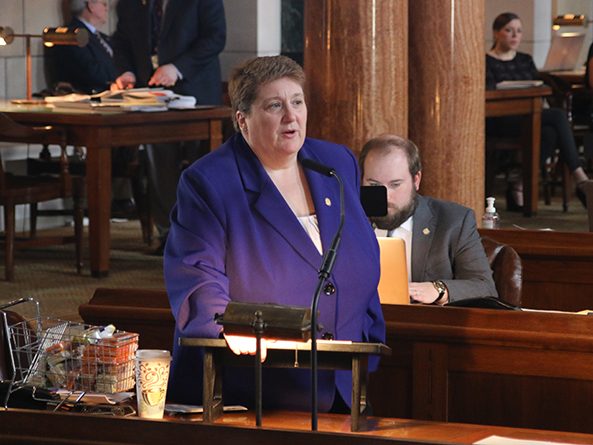Proposal for convention of the states considered
Lawmakers debated a legislative resolution April 10 that would serve as Nebraska’s application for a convention of the states. The Legislature recessed for lunch before voting on the resolution.
Introduced by Sen. Laura Ebke of Crete, LR6 calls for a convention of the states, authorized under Article V of the U.S. Constitution. Congress would be compelled to call a convention of the states if a two-thirds majority — 34 states — pass identical resolutions.
The proposed convention would be limited to proposing amendments to the U.S. Constitution that impose fiscal restraints on the federal government, limit the power and jurisdiction of the federal government and implement term limits for members of Congress and federal officials.
Proposed amendments would be sent to the states for ratification. It would require a three-fourths majority — 38 states — to ratify an amendment to the U.S. Constitution.
Ebke said Article V puts states on an equal footing with Congress when proposing amendments to the Constitution. This gives state legislators the ability — and perhaps the responsibility — to propose amendments to the Constitution to rein in the federal government, she said.
Sen. Adam Morfeld of Lincoln opposed the resolution. He said there is no federal legal precedent that guards against a runaway convention of the states and that it is unclear whether states have legal authority to bind their delegates at such a convention to vote as directed. Additionally, balanced federal budgets in the late 1990s and early 2000s are evidence, he said, that the proposed convention’s goals of controlling federal spending can be achieved without a constitutional amendment.
“This is not a constitutional crisis,” Morfeld said. “It does not require us blowing up the system and starting all over.”
Nebraska has filed several applications for amending conventions on various issues since achieving statehood, Ebke said, and concerns that a convention of the states would propose amendments outside its original purpose are unfounded.
“Congress has never proposed a complete rewrite for a new constitution,” she said, “and it stretches the bounds of creditability to think that a convention of states would do so.”
Sen. Steve Halloran of Hastings supported the resolution. He said that the size, scope and power of the federal government have grown at the expense of states’ rights and individual liberty and that federal spending has created almost $20 trillion in national debt.
“The U.S. Constitution is not broken, but government is,” Halloran said. “An Article V convention of states will aid and address the many serious concerns of Nebraskans by helping return our country to its original vision of limited government.”
Halloran said multiple safeguards would protect against a runaway convention. Two-thirds of states would have to pass applications for conventions with the same subject and scope and states could bind their delegates. Finally, any proposed amendment would then have to be ratified by 38 states, a tall hurdle, he said.
Sen. Curt Friesen of Henderson also supported the resolution, saying that a convention of the states is needed to address the growing federal debt. Friesen said he attended a mock convention of the states last summer in which delegates debated a proposed amendment to require a balanced federal budget. Even if an actual convention of the states proposed a similar amendment, he said, it would require approval from all state delegates.
“It’s almost an impossibility to think that — even if we draft a good amendment — it would come out of [a convention],” he said.
Sen. Sue Crawford of Bellevue said in opposition to the resolution that a constitutional restraint on federal spending would limit the government’s ability to respond in times of economic downturn, natural disasters, conflict or other crises. Crawford said Congress and the political process are broken, but a convention of the states is not required to fix them.
“It requires attention and mobilization of citizens to demand from Congress action, to demand wise decisions, to stand up and unmask decisions that are driven by ‘big money,’” she said.
Sen. Kate Bolz of Lincoln also opposed the resolution. Federal funding accounted for approximately 31 percent of Nebraska’s budget in fiscal year 2015-16, she said, including 23 percent of its education budget and 52 percent of the state Department of Health and Human Services budget.
“From a budget perspective, I would argue that LR6, while it is exciting idea … in practice could have severe fiscal implications for our state budget,” she said.
The Legislature recessed for the morning without voting on the resolution. Speaker Jim Scheer of Norfolk has indicated that, because of the limited time remaining in the session, legislation that is expected to generate extended debate will not be scheduled for a full six hours of debate on general file if the introducer lacks the 33 votes required to invoke cloture, or cease debate and vote on a bill.


